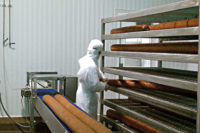
Pest control is a basic part of food safety, though perhaps not one that gets much attention on its own. However, it is an aspect that is just as important as any other as part of a total food-safety management system.
Pest control is part of the basic plan for sanitary practices in a processing plant. “Plants are required to have sanitary performance standards,” says Amanda Eamich, spokeswoman for the U.S. Department of Agriculture’s (USDA) Food Safety and Inspection Service (FSIS). “It relates to over all sanitation so they are required in [Hazard Analysis and Critical Control Points].”
It’s part of regular FSIS inspections, Eamich explains. Points of noncompliance with sanitary standards such as a door not closing properly or improper storage of garbage will be noted in an inspection.
“It’s part of the food safety plan a plant has to have in place,” she says.
Keeping things clean
According to FSIS regulations, the grounds about an establishment must be maintained to prevent conditions that could lead to unsanitary conditions, adulteration of product, or interfere with inspection by FSIS program employees. Plants must have in place a pest-management program to prevent the harborage and breeding of pests on the grounds and within establishment facilities. Pest-control substances used must be safe and effective under the conditions of use and not be applied or stored in a manner that will result in the adulteration of product or the creation of unsanitary conditions.The agency has said proper maintenance of the grounds around an establishment is essential for ensuring good sanitation. FSIS inspection program employees request written designation of establishment boundaries only to facilitate their inspection of the establishment. Companies are responsible for preventing adulteration of product even if the sources are outside the designated boundaries of the plant, if they are areas under the company’s control.
The FSIS has set down regulations that recommend an integrated pest-management system (IPM). This kind of system takes into account pest ecology and the effect of pesticides and other pest-control chemicals on the environment and on food. For the most part, IPM has been used within farms and not plants. However, it is also applicable to meat and poultry processing.
The agency does require that any pest-control system used by a company be designed and implemented to ensure products aren’t adulterated or contaminated by pests or materials designed to control them, and that the pest control system does not create unsanitary conditions.
Handle with care
Chemicals, such as insecticides and rodenticides, do require special handling. Pesticides used in plants do not need FSIS approval before they can be used. However, companies are responsible for developing and implementing HACCP plans incorporating the controls necessary and appropriate to produce safe meat and poultry products. Consequently, businesses are responsible for ensuring that the pesticides and rodenticides they use are safe and effective.The federal Environmental Protection Agency (EPA) does have requirements and review programs for pesticides. Under the Federal Insecticide, Fungicide, and Rodenticide Act (FIFRA), EPA reviews pesticide formulation, intended use, and other information; registers all pesticides for use in the United States; and prescribes labeling, use, and other regulatory requirements to prevent unreasonable adverse effects on the environment, including humans, wildlife, plants, and property. Any meat or poultry establishment using a pesticide must follow the FIFRA requirements.
The FSIS also requires that documentation confirming the safety of pesticides needs to be available to its inspectors as a part of regular inspections. The documentation needs to include proof of EPA registration and could also include other information such as letters of guarantee from the manufacturer, labels, application instructions, and records of use that establish the safe and effective use of these products. FSIS inspection program employees will review these records as necessary, as well as observe the application and storage of pesticides to ensure the maintenance of sanitary conditions and that product is not adulterated.
Establishments must have in place a pest management program to prevent the harborage and breeding of pests on the grounds and within establishment facilities. Pest control substances used must be safe and effective under the conditions of use and not be applied or stored in a manner that will result in the adulteration of product or the creation of unsanitary conditions.
Pest problems themselves haven’t been a problem in recent years. A search of the FSIS recall archives back to 2002 showed that no recalls have had pests as the reason. However, Eamich said that food produced under any kind of unsanitary conditions and sold over states lines would be recalled.


Report Abusive Comment